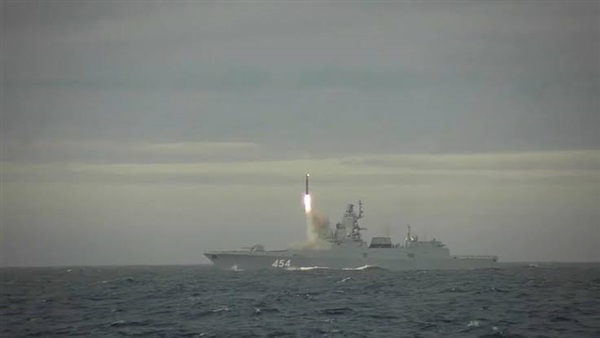Russian hypersonic missile tests send message to Sweden and Finland over Nato bid

Russia has test fired a hypersonic missile from a warship in the Barents Sea in an apparent warning to Sweden and Finland as they seek to join Nato.
The Russian defence ministry said a Zircon cruise missile was fired from the Admiral Gorshkov, a frigate, at a target about 600 miles away in the White Sea.
The Zircon, described as the world’s fastest non-ballistic missile, can be armed with a conventional or nuclear warhead and is believed to be able to evade existing defences.
The ministry released a 30-second video of a missile being fired from the frigate and vanishing into the clouds. No further details were released.
Sergei Shoigu, the defence minister, said last week that Russia would increase its military spending and form new military units in the west in response to the countries’ application to join Nato. Russia’s invasion of Ukraine prompted the two countries to seek membership after years of neutrality.
President Putin has said the roll out of cruise missiles on frigates, cruisers or submarines would enable strikes within minutes on “decisionmaking centres”.
Finland said on Friday that it would station its fleet of F-35 combat aircraft in the Arctic Circle from 2026, which could provide Nato with its most northerly base.
A day earlier, two Norwegian Air Force F-35s were scrambled from Evenes in the north of the country to meet two Russian military aircraft over the Barents Sea.
The Zircon, which is purported to reach nine times the speed of sound, is one of several hypersonic missiles being developed in Russia. Last month the Kremlin tested another new intercontinental missile, the Sarmat or Satan 2, capable of carrying ten or more nuclear warheads and reaching the US.
The Russian defence ministry also released footage yesterday of its troops in Ukraine firing a Malka artillery piece. The 203mm gun, one of the most powerful in the world, was created in the 1980s and updated two years ago. It can be armed with tactical nuclear warheads and has a range of 31 miles.
Andrei Kelin, Russia’s ambassador to Britain, said he did not believe his country would use tactical nuclear weapons in the conflict.
He told the BBC: “We have strict provisions on the . . . use of tactical nuclear weapons and it is mainly when the existence of the state is endangered.”







